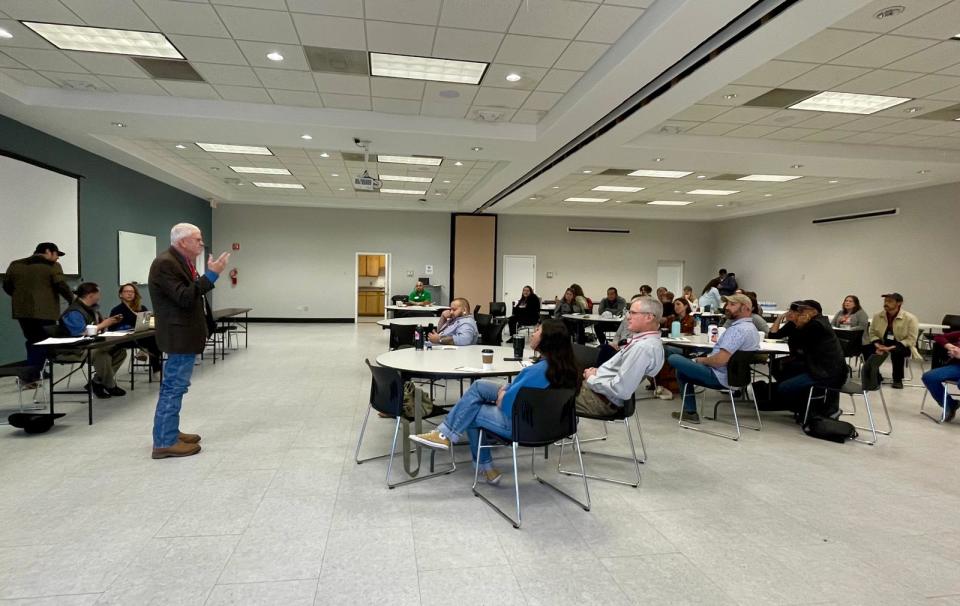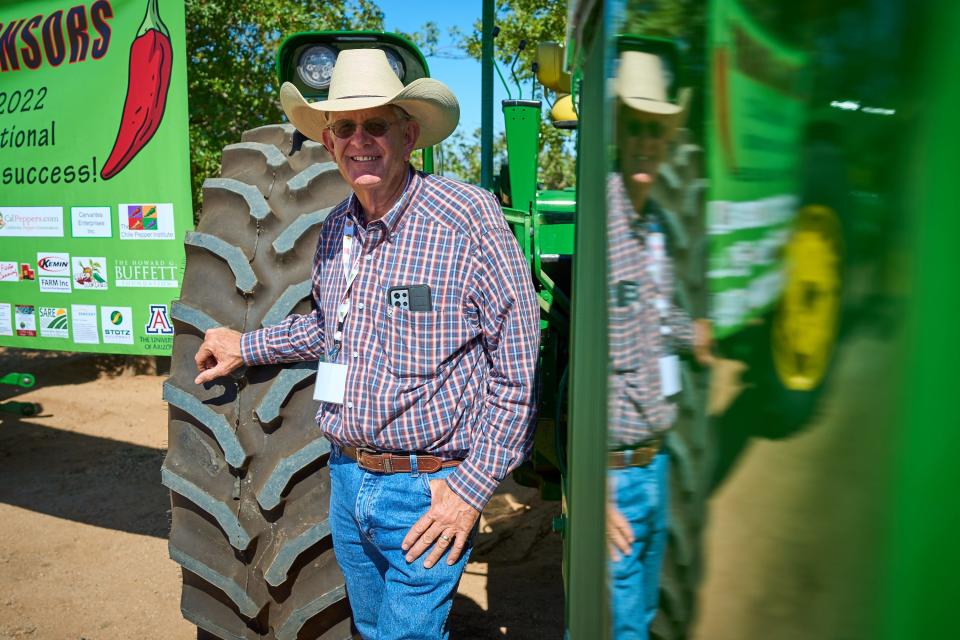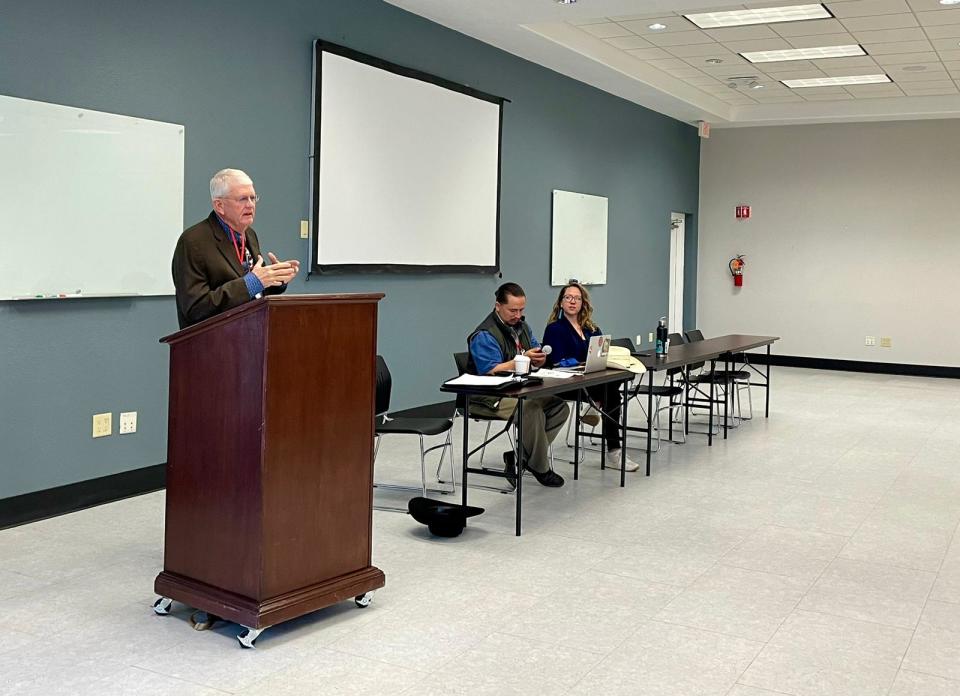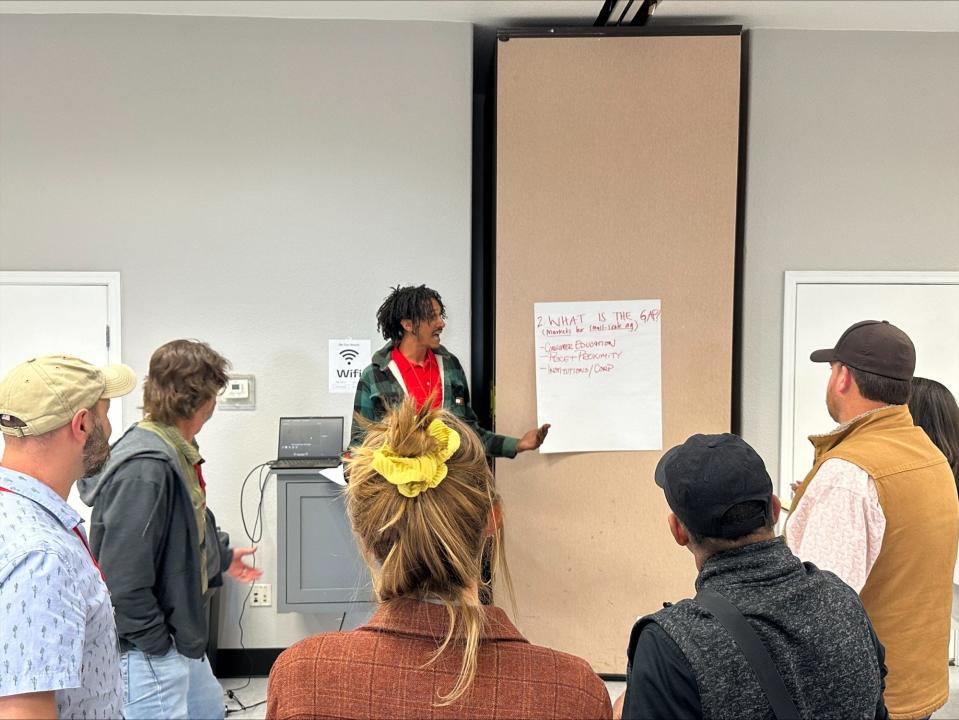'We want to stay on our land': How small Arizona farmers are trying to support each other
DOUGLAS — Small farms once dotted the landscape in the Sulphur Springs Valley, but they have been fading since the 1980s. The same policies and programs that incentivized producers to "get big or get out," punished those who did not.
Now some of the small-scale growers who remain gathered with allies earlier this month to discuss the challenges and opportunities to preserve small farms’ livelihoods in southern Arizona.
The event, the first summit of the newly formed nonprofit Farmers Organizing and Creating Opportunities, is also the first step toward ultimately building a farmer-led “grassroots movement," said Aaron Cardona, an organic grain and vegetable farmer from McNeal and the chairman of the new organization.

Access to capital and markets still holds back small-scale organic growers in the area, said Cardona. They are also heading into a water-scarce future with new government regulations.
“We want to stay on our land,” said Cardona, a third-generation Mexican-American farmer. “We want to pass this to our kids.”
In panels and breakout groups, growers and others discussed the needs and potential routes to build strong marketing and branding strategies for specialty crops, how to bring added value to their product, and how to expand farm-to-institution models. They called for the creation of the first committee within FOCO to lead branding and marketing research.
At the farmer-centered summit were about 15 producers and several food system advocates. Government representatives attended as listeners. Among them were Gloria Montaño-Green, U.S. Department of Agriculture deputy undersecretary, and Arizona Department of Agriculture Director Paul Brierly.
The event was held in collaboration with Potlikker Capital, a tax-exempt charitable capital fund that serves farmers and ranchers who are BIPOC, Black, Indigenous, and people of color. In Arizona they’ve awarded five loans and grants.
Pinnacle Prevention, the Community Food Bank of Southern Arizona, and the Arizona Food Systems Network provided seed grants for the event.
"One of the greatest benefits (of FOCO) has already happened," said Claudio Rodriguez, director of policy and community organizing at the Community Food Bank, and a board member at the nonprofit. "It's that connection time between farmers, government agencies, and folks who will help with the market and procurement process to get farmers products out into Arizona and onto the table of Arizona families."
"Arizona can feed itself, but only if it chooses to support it small rural farmers."
Growth of large farms: Fewer farms, same number of acres: What the new agriculture census means for Arizona
'Small agriculture is what built us'
Cardona remembers growing up in a valley full of small farms. But as he grew older, that landscape shifted as many family farms went out of business or sold to larger operations.
Out-of-state dairy conglomerate Riverview and several large-scale pecan farms now dominate a lot of the agricultural production in the area.

Ed Curry, president of the successful Curry Seed and Chile Company and a speaker at the event, remembers the valley as a place where everyone knew and cared for each other. His dad and Cardona's grandfather farmed together.
“We were raised by the community, and at the center of it were the farms,” Curry said. “Small agriculture is what built us.”
The question, he added, is “how do we keep small agriculture alive?”
Food system advocates argue that a diversity of large and small farms is needed for resiliency, and use as a cautionary tale the COVID-19 pandemic, when distribution chains were disrupted and local producers became the main suppliers overnight.
Corporate farms were less nimble to the shock, Potlikker Capital co-founder Mark Watson told The Republic.
“The scales are so large that it's like turning an ocean liner," he said. "If you have a big ship and you want to turn it around, it's a big issue. If you have a tugboat or a speed boat, you can flip it around."
He believes the dependency on small and local farms during the pandemic shouldn’t be seen as an accident: “It’s a signal to reinvest and bolster them.”
Local farms: Support for locally grown food is high. Here's why land in Phoenix is scarce for the growers
The key is sharing knowledge
Joseluis Miguel Ortiz y Muniz from New Mexico’s Greenroots Institute, and Audra Christophel with the Community Food Bank of Southern Arizona, sat next to Curry at one of the panels.

Speakers shared their experiences and insights on how to build opportunities and better markets for specialty crop growers and marginalized producers, those who are often underserved by government programs or face barriers to loans and grants.
Ortiz shared the main lessons behind the success of New Mexico’s Agri-Cultura Network, a farmer-owned cooperative that has bolstered small farming economies and agricultural education in the New Mexico community of South Valley. In its early days, it was made of three farms, but today has some 40.

Christophel spoke from her experience helping establish a program that supplies large institutions in Tucson, like hospitals and school districts, with locally grown food from small producers. At the start of the program in 2015, sales were $30,000. For 2024, farmers have landed about $750,000 in contracts.
“The key is sharing,” Ortiz said. “Nothing good is going to come out from holding knowledge.”
A way forward from the ground up
Producers at FOCO are already working together but hope to grow in number.
Board members John Benedict and Jillian Werhowatz run a Community Supported Agriculture program, or CSA, through their retail store, The Local Co-op, in McNeal. Cardona and his cousin, Bryan Fontes, who is also part of the board, help supply the program.
In CSA models, consumers buy shares of the farms’ harvest in advance and receive weekly farm boxes. Benedict launched the program last July, and today supplies about 32 families in Cochise County. About two-thirds pay with SNAP benefits or receive in-house financial aid from a fund built by private sponsors.
Most of them rely on sales to local farmers' markets in Bisbee, Sierra Vista and Tucson, and supply the Community Food Bank of Southern Arizona, Arizona Food Bank Network, Pinnacle Prevention and Pivot Produce.
Cardona believes the nonprofit figure will help them and other small producers and organic producers gain a stronger voice and “a seat at the table.” Coming together will make organizations and institutions more receptive to their needs, some of them as simple as getting extension specialists assigned.
The conversation, he said, "has to be led by people who are actually making a living off their land.”
At the end of the event, and after blessing the food, attendees ate a locally sourced lunch: red chile and green-chile casserole from Ochoa Farms, local beef, enchilada sauce from Curry's farm, frijol mechudo beans from Arevalo Farms, salad greens and micro-greens from Likah's veggies, and fresh-made tortillas from Mexican June maize.
Clara Migoya covers agriculture and water issues for The Arizona Republic and azcentral. Send tips or questions to clara.migoya@arizonarepublic.com.
You can support local journalism in Arizona by subscribing to azcentral.
This article originally appeared on Arizona Republic: How small Arizona farmers are trying to support each other

